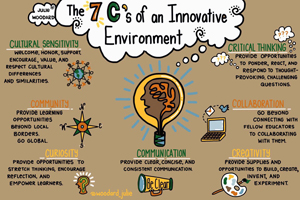
Have you heard of the popular trend that’s taking K–12 classrooms and faculty meetings by storm? Breakout EDU is a collaborative “immersive learning games platform” where students are faced with challenges that unlock combinations needed to open the Breakout EDU box. In addition, there is a competitive beat the clock component that keeps students (and faculty) motivated. Challenges are engaging and interactive—like breaking into, rather than out of, an escape room. I haven’t met anyone that I have shared the activity with who hasn’t enjoyed it, including adults.
Games range from early elementary to high school and in many cases, are suitable for higher education students. My graduate education students love the excitement of completing the Breakout EDU games and collaborating, communicating, critical thinking, and creative problem solving. Opening a variety of locks on the Breakout EDU box leads to a gratifying experience and is enhanced by holding one of the “We Broke Out” or “We Rock!” signs in front of the stopped timer. I love helping my students explore their curiosity of children’s literature while working in engaging and active ways.
Currently, one of the games being spotlighted is The Dot, based on author Peter H. Reynolds' book. The Above and Beyond video representation of the book is used to help students learn about the Partnership for 21st Century Learning’s (P21) four Cs of 21st century learning: communication, collaboration, critical thinking, and creativity. When I teach this lesson with my teacher candidates, we discuss the importance of what we refer to as the “fifth C:” curiosity, the spark that makes the learning personally meaningful and self-motivating.
Recently, I came across an infographic poster on Twitter, created by “sketchnoter” Julie Woodard, titled “The 7 Cs of an Innovative Environment.” This poster builds on P21’s framework to include curiosity, cultural sensitivity, and community—all skills important for maintaining a healthy classroom environment. In addition, these skills support STEM and STEAM initiatives.
There are many games in the areas of seasonal fun, computer science, art, math, social studies, science as well as mysteries and social skill development. Create an account and explore the possibilities. Then “Break Out” for some engaging and highly interactive collaborative game excitement that develops life skills needed in and out of the classroom!
 Mary Beth Scumaci is a clinical associate professor and technology coordinator with the Department of Education at Medaille College in Buffalo, NY. She designs and instructs technology and online courses in addition to facilitating technology trainings for students, faculty, and staff.
Mary Beth Scumaci is a clinical associate professor and technology coordinator with the Department of Education at Medaille College in Buffalo, NY. She designs and instructs technology and online courses in addition to facilitating technology trainings for students, faculty, and staff.
This article is part of a series from the International Literacy Association Technology in Literacy Education Special Interest Group (TILE-SIG).